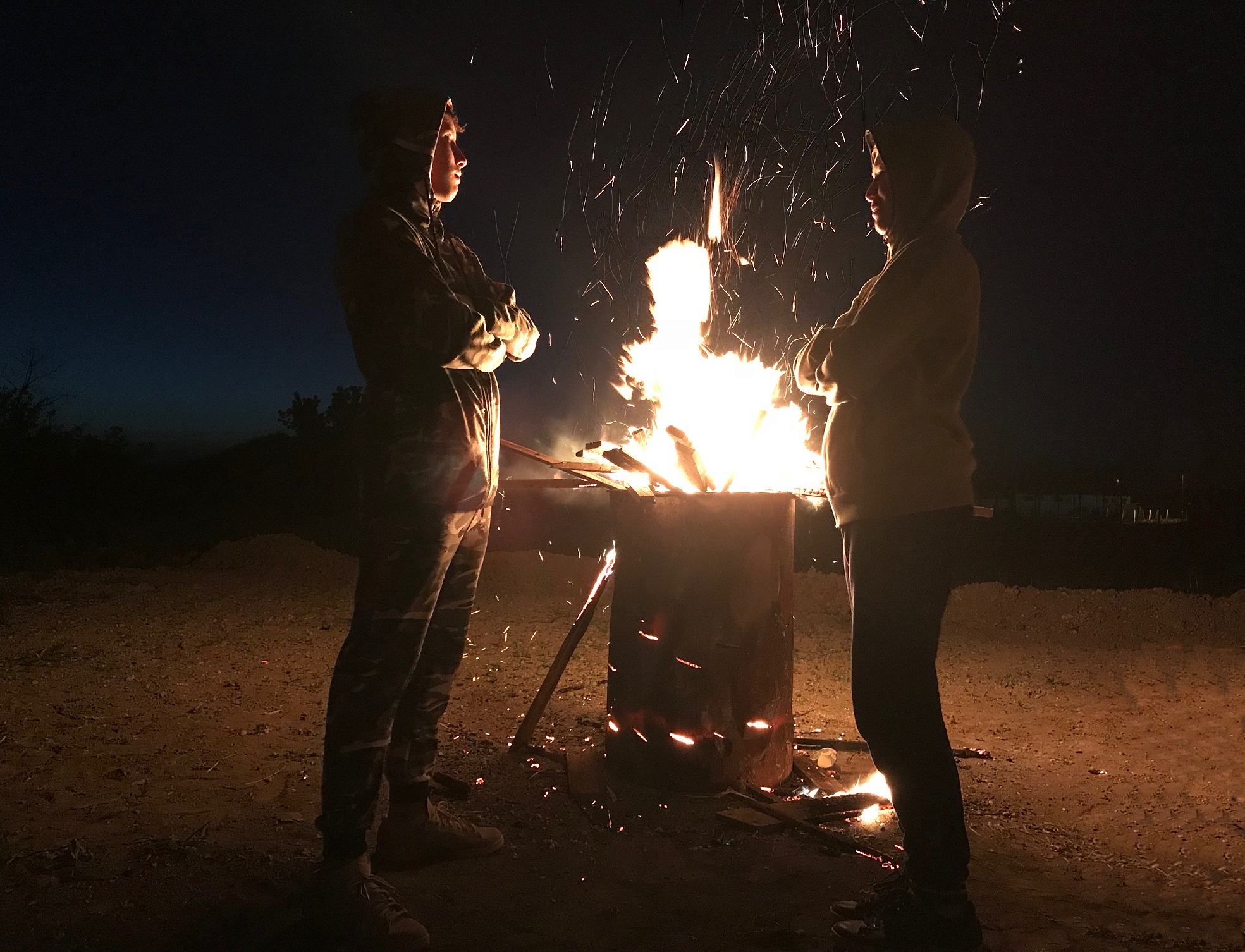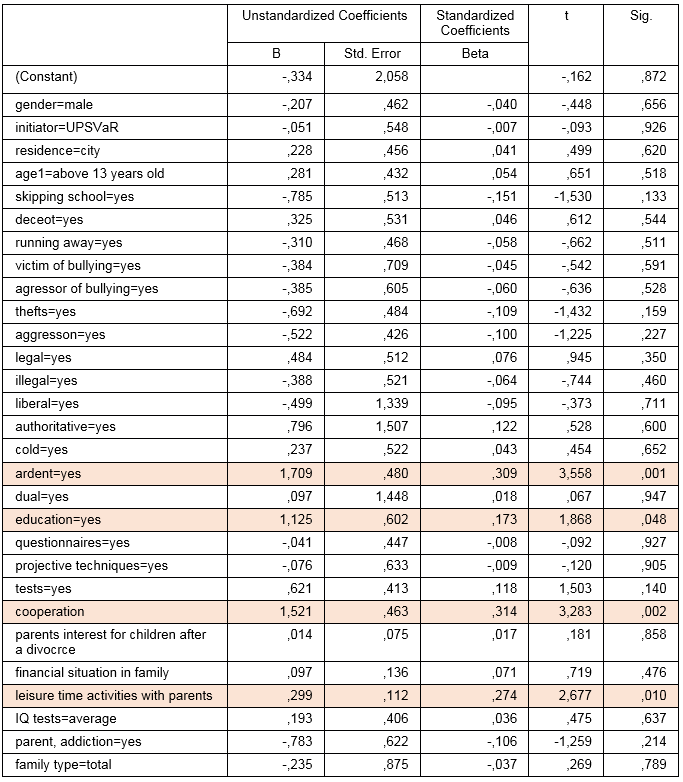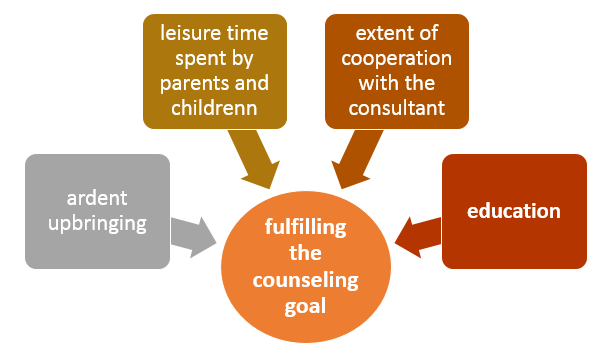Abstract: The following submission revolves around the social counseling as one of the solutions of upbringing problems. It is coinceived in a theoretically-empirical manner, while the point of the research is to indentificate which of the factors of social counseling and family enviroment take part in the solution of upbringing problems. Data in this research was acquired by analysis of scripts detailing psychological counseling services. The research consits of submissions of 109 clients and one of the primary conclusions is the discovery of the fact that the main point of counseling is fulfilled when the client cooperates with a counselor, when the family practises an ardent way of upbringing, when parents spend their free time with their children and last but not least, when education is used as one of the methods of social counseling.
Key words: social counseling, upbringing problems, the process of counseling, the goal of counseling.
 Foto: Peter Senko (2018)
Foto: Peter Senko (2018)
INTRODUCTION
The following submission revolves around the social counseling as one of the solutions of upbringing problems. Currently, a rise in such occurences can be observed, like f. e. skipping school, deceit, thievery, bullying, aggressive behaviour, substance abuse and so on. Those are juvenile sociopathological cases, which are determined as endogenous (nervous system, genetic dispositions and other) and exogenous (f.e. disfunctional family, socializing issues, inappropriate ways of upbringing, presence of sociopathological factors in the family and other) influences. Based on a long history of experiences in a position of social counselor, we try to empirically identificate factors in social counseling and in the family enviroment, which influence the solution of these problems.
1 THEORETICAL BASIS OF THE ISSUE
Social counseling in a context of solution of upbringing problems
According to Schavel and Olah (2008, p. 12), we can define counseling as a 'specific professional activity for which is a help by using existant sources and means of a person to deal with actual problems in life characteristic'. Afterwards, an identification is used to determine the purpose and content of the counseling, which can have a legal, medical, social, psychological or economical character. The counseling is controlled and has a purpose of problem, conflict and quandary disposal. It also targets the people who are able to handle their situation by themselves and take full responsibility for their behaviour. Mydlíková (2004, p. 7) defines social counseling as a 'process, which takes place by means of development of the relationship between the social client and social counselor, using different counseling forms and work methods and of which purpose is to increase the quality of client's life, with a help of mobilization of inner and outer sources of his natural habitat.' Strieženec (1996) states that counseling is based on help, development, support, optimal operation of an individual, his better orientation in life. Matoušek (2008) defines counseling in the strict sense as a provision of information, which the client requests, in a broader sense a counselor gives his client an opportunity to investigate his strenghts and weaknesses and to find a strategy which would lead to a positive increase in his quality of life. A much more difficult goal in the previously quoted author's opinion is for the client to acquire a new view of himself and of others and also new much needed abilities (counseling and psychotherapy compliment each other in this particular case - a part of the counseling process is teaching and acquisition of an insight). According to Pavelová (2007, p. 41) is counseling in a broad sense 'a method of education and reduction of emotional pressure, a method of helping a human being with solution of his problems and finding new ways of life simultaneously.'
According to the law NR SR č. 448/2008 Z. z. about social services, basic social counseling and specialized social counseling belong to professional activities (§ 16). Quoted law defines social counseling as a 'professional activity, with a purpose of helping an individual in an unfavourable social situation.. Social counseling is carried out on a level of the basic social counseling and specialized social counseling' (§ 19, ods. 1). Basic counseling has a purpose of finding out the magnitude of a problem of an individual, a family or a community. It includes administrating primary information about possible ways of solving the problem or in some cases a recommendation and taking care of further help. Specialized social counseling has a purpose of indentifying the origin, magnitude and the character of individual's, family or a community problems and taking care of professional help. It can be carried out in counseling offices, or by a terrain form with terrain programs (§ 19, sec. 2 – 4).
In our submission, we focus on counseling families whose children have certain educational problems. This issue falls under the jurisdiction of the Office of Labor, Social Affairs and Family,Department of social protection of children and social guardianship and is implemented at the Consultancy-psychological services. As noted by Schavel and Olah (2008) the most intensive reliability is on the meaning and wording of the Act of the National Council of the Slovak Republic no. 305/2005 Coll. on social justice, child protection and social care. For the needs of our work, it is especially important to have a guardianship of children. Considering that we are focusing on children's educational problems. Social guardianship provides measures for children who have certain behavioral disorders, are committing delinquency, suffer from substance abuse or abusive or one time usage addiction, or a one-off, extremely serious socio-pathological phenomenon.
Upbringing problems
In literature we can find several titles for problematic behavior of children and youth, eg. dissociation disorders, behavioral disorders, sociopathological phenomena, deviant behaviors, asocial behavior, social maladaptation, educational problems (especially related to pedagogy), taking too many risks. We can see various titles of these undesirable behaviors in the multidisciplinarity of these phenomena, disciplines that can solve these issues are for example, medicine, sociology, psychology, pedagogy, social work. This is confirmed by the authors Levcikova et al. (2013) who reports that behavioral disorders in the professional and practical sense of the word are very broadly understood. Basically it is diversity (both in terms of speech and causes) of forms of non-adaptive behavior that have an unfavorable influence on the social relations of the individual and on his social adaptation. They all have one thing in common, they are all serious abnormalities of social norms, such are lying, thievery, running away from home, skipping class, bullying, wandering around, interpesonal relationships issues, outstanding displays of negativism and so on. (Matějček, 2011, Levčíková, 2013, Oravcová, 2007, Fisher, Škoda, 2011).
During this time, the adolescent disconnects from his family rodiny, and if he has not formed any emotional bounds by then, he has no reason to respect his parents anymore. He may start to act without any boundaries, parents no longer represent an authority, not even school has any power to influence such behaviour. The first delineuqncies begin to appear with a criminal behaviour character (like f.e. thefts, assaults and so on) (Vágnerová, 2008). A peer community becomes very important factor, which becomes his great support, a place, where through friendship one tries to find himself, shapes his identity frees himself from the depedance on his family, which loses its priority in the relationship network of an adolescent. However, the importance of this community depends on the quality of his family background, relationships in the family and up to some point the success in one's life (school). Most adolescents do not disconnect from their family because of becoming a part of these communities. It is a different story in cases such as with disfunctional families, for them, this community is crucial and their need for positive acceptance (which they do not get in their faimilies) is extremely high and it leads to outstanding preference of such a community. A membership of such a community becomes a necessity.Mainly adolescents with undesirable social background unfortunately join groups, which tend to be labeled as socially ineligible (Oravcová, 2007). A group, mainly if it is organized and has a hierarchy has it own set of rules, which can support further development of problematic behaviour. In such group, different figures of behaviour tend to be useful, contrary to those in society (Vágnerová, 2008).
Factors of emergence of sociopathological occurences can be determined by a complex of different biopsychosocial factors, however a negative influence of the family belongs to very frequent and radical causes. It is the most importatn social community, in which an individual lives. In this enviroment both primary and secondary needs get satisfied, while it provides a background much needed for social self fullfilment, it is a source of experiences, of figures with exemplary behaviour, that are unattainable in other enviromens. Each and every family is a source of a specific system of values, which influence the behaviour of its family members during interactions with wider social communities. In some cases, it can become a hindrance and it can be a source of emergene of different sociopathological occurences or psychological problems (Fisher, Škoda, 2009). It was greatly summed up by an author named Kašparů (2011, p. 17), who had been working with alcoholics, murderers, psychopats in a strong pathological enviroment for 35 years now 'Everytime when I enclose a case or prescribe a drug to a young man, I ask myself two questions. From what kind of family does he come from and what kind of family will he establish?'
Family is crucial during the creation of behavioral abnormalities, because the child can acquire problematic behavior through imitation, it can also adapt different system of values, a child can also make an experience of morning emotional deprivation very inconvinient, which can change the child's personality.
Within the frame of prevention and correction of such behavior abnormalities, the cooperation with the family with an emphasis on support of adequate functioning of a family in its earliest period is crucial. Help can be granted by a counselor, a centre of psychological pedagogy counseling and prevention or scripts of psychological counseling services (Matějček, 2011).
As most important we consider and highlight the fact that the activities of social counselor on behalf of the client have a wide spectrum, where the important factor is social prevention and social counseling, as one of the possible ways of helping an individual, ho has problems. Motivation of the entire family towards cooperation on solution is the main duty of a social couselor that is currently working with a family. An important instrument of working with family is a discussion, that can be a great contribution towards a successful cooperation and towards forming great bonds based on trust. We are talking about an effective instrument, that can allow acquisition of a lot of information about previous roles, interests, perception of family relationspihs, identification of a person in the social enviroment, recognition of independence. It can also motivate an individual towards a healthy and active lifestyle. (Juššiková, 2011).
Upbrining problems fall under the domain of competence of a social counselorm based on the facts stated above, we ask the question: which factors in social counseling and which factors in the family enviroment determine the successfulness or unsuccessfulness of the counseling procedure.
2 METHODS
The point of the research is to identificate, which of the factors of social counseling and which of the factors in family enviroment take part in the solution of upbringing problems, We acquired the data through documents, specifically client scripts. Hendl (2016) states that the documants can form the only basis of study or make up for the data acquired by observation and discussions. In our case the documents form the only basis of the empirical research, Social counselar makes his own entries of clients, which he protects from access of other individuals and takes full responsibility for protecting them. Information, which individual organizations acquire from clients, can be used to costitue social analysis, they are however obligated to uphold the rights of a client and protect his personal data (Mydlíková, 2004). In our research, there is not a single piece of personal data to be found, through which an identification of individual clients would be possible, through this we are trying to maintain the anonymity of our clients
We acquired information from the analyzed scripts, which we will now statistically analyze:
- Solution of upbringing problems - flexible „goal fulfillment“
, scaled from 0 (no results) to 10 (absolute success). We are talking about a counseling goal, which was established by the counselor and a client (a parent or a child), established in the first phases of the counseling process. F.e. with upbringing problems of skipping school, the goal was to eliminate this phenomena, with drug usage, the goal was to eliminate this phenomane and so one
The acquired data was statisically evalated in the program SPSS 22.
3 THE RESEARCH DESIGN
The research design consited of 109 clients (children with upbringing problems and their parents, which we acquired through an analysis of scripts). From their standpoint, it was youngsters with a display of sociopathological behaviour. There were 59 boys and 50 girls with an average age being 12,8 years (standard variation - 2 years). The most respondents were 12 year old, the youngest respondent was 7 years old and the oldest was 17 years old. According to Nielsen Sobotková a kol. (2014) we are dealing with an abrapt increase of all forms of risky behaviour in age from 11 do 14 years. 14 rokov. In our research the average age was around 13 years old, it were chidlren with upbringing problems, which conifrms the statements of the quoted authors. On average, the respodnants had one sibling and on average 0,72 half-blooded siblings (56% of children did not have a half-blooded sibling and 20.2% had 1 or 2 siblings).
Regarding family relationships, 20.2% of children lived in a complete family, the most biggest in numbers were those, who lived only with their mother (39.5%), followed by a family with a stepfather (18.4%). On a much smaller scale, there were those that lived with just their father (5.5%), grandparents (5.5%), the parents were in the procedure of divorce (5%), in a family with a stepmom (3.7%) and in a foster care (2.75%). We can see that almost 80% of children with upbringing problems did not live in a complete family, It is 29% more than in the research of authors Kožnar, Matijek a Uhrová (1979), who were focusing on children with problematic behavior. Those children were in 51% of the cases from divorced families. It is an older research, while it is obvious that from the year 1979, there was an increase in the total number of divorces ( not only in families, in which the children are the upbringing problem), which also lead to an increase of number of such families in our research files.
Regarding education of parents, most mothers (50,5%) and fathers (56%) had finished a vocational school. Then 20,6% of mathers had finished an university, 18,7% had finished only the primary school and 9,4% only finished high school. Regarding father, they had finished high school in 26,6% of cases, in 10,1% of cases they finished only a primary school and in 2,75% of case, they finished an university. 1%of mathers and 4,6% of fathers diedo. The vast majority of mothers (57%) and fathers (64,2%) were employed. More mothers (23,9%) than fathers (14,7%) were unemployed. On a much smaller scale 3.7% of mothers and 4.6% of fathers (4,6%) were self-employed, 1,8% of mothers and 4,6% of fathers worked abroad. 11% mothers were on maternity leave, 0,9% in prison. 3,7% of fathers were in prison and 0,92% were retired or disabled.
4 RESULTS: Analysis of factors, contributing to fulfillment of the goal of counseling
The analysis of factors, which contribute to the fulfillment of counseling goals was carried out by statistic methods: multilinear regression analysis, which identificates the effects of the independent factors on the dependan factorst.
Dependant factors was the goal completion rate, which was measured in a 10 point scale (0 - no cooperation, 10 absolute cooperation). Independant factors were: demographic characteristics (gender, residence, age), individual upbringing problems (skipping school, deceit, running away, bullying - both the victim and the aggressor, thefts, aggressive behavior, legal and illegal drugs), methods of upbringing (liberal, authoritative, cold, ardent, ambivalent) methods of counseling (education, questionnaires, projective techniques, tests) the extent of client's cooperation, aspects on behalf of family (parent's interest for the children after a divorce, financial situation, leisure time activities with parents, parent's addictions, and parent's).
After inspecting the assumptions, we proceeded with establishing a regression model. The analysis of dispersion gained a value F= 7,454 (p=0,000), which confirmes that the result of regression is significantly different from zero.
Based on the result in the first chart, we can state that the independent factors chosen by us explain 70.7% the dependant (the extent of goal fulfillment). In the next chart, the variable factors are highlighted, which have a significant effect on the extent of the goal's fulfillment.
Table 1 The extent of dispersion of the variable dependant factor on variable independent factor explained

In the table number two, we can see the significance, which indicates that 4 variable independent factors have an influence on a variable dependant factor. Specifically, it is about an ardent upbringing, education, extent of cooperation and leisure time spent by parents and children.
The next point of interest is the coefficient B, which expresses the influence of the variable and independent on the variable and dependant. In a case of ardent upbringing, the fulfillment of the goal would increase by 1,709, which means that if the method of cold upbringing was replaced by ardent upbringing, the goal fulfillment would increase by 1,709 points. Then if education was used in the counseling process the goal fulfillment would increase by 1,125 points on average. If the cooperation of parent and the counselor increased by one point, the extent of fulfillment would increase by 1,521 points. And finally, if the parents spent more times wth their parents (by one more point), the extent of goal fulfillment would icnrease by 0,299 points on average.
Value beta also intrigues us, it expresses which of the variable and independent has the biggest influence on the variable and dependant. We can see that it is the variable 'cooperation' that has the biggest influence on the extent of fulfilling the counseling goal, then it is the upbringing (ardent), a much smaller influence goes to spending leisure time with parents and relatively lowest goes to the education in the counseling process. Stated discoveries are visualized on the picture number 1.
We can see that other variable factors, f.e. the type of upbringing problem, demographic characteristics, contact initializor or type of the family do not have any influence on the extent of fulfilling the goal of counseling.
Table number 2, linear and regressive analysis of social and family factors in context with the fulfillment of the counseling goal.


Picture number 1 The influence of factors of the family enviroment and social counseling on the extent of fulfilling the counseling goal.
The poin of the research was to identificate, which of the factors of social counseling take part in the extent of solving the upbringing problems.
The research consisted of two parts. The first part was focused on acquisition of data through analysis of the content of clients' scripts on counseling psychological services.The result of the first part were the chosen and variable ones, which were quantitatively analyzed and evaluated - this process formed the second part of the research. From the individual scripts, we chose mainly the information about the extent of client's cooperation, about the extent of stated goal's fulfillment, about the methods of working with the client, forms of upbringing problems, methods of family ubpringing and other.
For the fulfillment of the stated goal, we used a statistic method - regressive analysis. By that method, we searched the variable, which have a big influence on fulfillment of the counseling goal, in other words, we looked for a predictors of the goal's fulfillment, so called factors, which contribute to the fulfillment or vice versa. Regressive analysis is used for the analysis of relationships between the variable. The goal is to predict the values of the independent and variable (in our case, the extent of fulfillment of the counseling goal) on the base of values of the independent variable ( in our case the demographic characteristics, individual upbringing problems, methods of upbringing, methods of counseling, the extent of cooperation of the client, aspects on behalf of the family).
We found out that the independent and variable chosen by us explain 70,7% of the independent variable, which is rather a great value. The result indicates that the independent variable, which we included in the analysis, really contribute to the fulfillment of the counseling goal in some way. Precisely, from all the variable, the most significant seem to be the following: ardent upbringing, method of education in social counseling, the extent of cooperation and leisure time activities with parents. The extent of cooperation of the counselor and the client had the biggest influence on fulfillment of the goal. The second greatest influence goes to the ardent upbringing, the next one was spenindg free time with children and somehow the smallest influence goes to the education in the process of counseling.
Based on the information stated above, we can sum up that the predictors of a successful social counseling for children with upbringing issues (and their parents) are: a great extent of cooperation with the counselor, ardent upbringing in the family, an adequate ammount of spending leisure time with children, utilizing the methods of education in counseling. Risk factors are: parent's addiction, lack of interest for children, bad financial situation of the family.
On the base of summariyed theoretical knowledge and gained results we formulate the following practical recommendations:
- The primary role of the social counselor should be to create an interest in client, his encouragement, motivation, so he would be more willing to cooperate because it predicts the extent of the fulfillment of goal and by that the content of the counseling process. Mainly in the initial phases of the counseling process but also in the process it is suitable to use encouragement, evaluation, ventilation, which can help maintain the optimal atmosphere in the process of counseling.
- Another important factor is the idenfitication of upbringing, which can be observed, you can also find it out by a discussion with parents or children, suitable questionnaires or projective tests. A high risk is minly liberal and cold upbringing, on the contrarym, the most positive factor is an ardent upbringing. If the parent utilizes an ardent way of upbringing, the extent of fulfilling the counseling goal is much bigger. In case he uses inappropriate ways of upbringing, it is important to inform parents of the more suitable methods (f.e. approach of partnership in the upbringing) and f.e. by various techniques (roleplaying, modeling) they could also practice those techniques.
- An interesting factor, which influences the fulfillment of the counseling goal is the amount of free time, which parents spend with their children. We discovered that parents with problematic upbringing tend to spend less below average time with their children (there is the question, why is it like that. Are the relationships of parents and children so spoiled that they can no longer spend their free time together? Or the small amount of time spent together leads to spoiled relationships and the appearance of different kinds of sociopathological phenomena in children?). The job of the counselor in this case should be providing information about the importance of the free time spent together. Connected with providing information about more effective styles of upbringing, we are positive that it could have a positive effect on the parent-child relationship.
- As a last important factor seems to be the education, which in a sense affects the fulfillment of the counseling goal. In the process ofeducation, the counselor focuses mainly on teaching the client about more appropriate ways of upbringing, more effective communication, more effective ways of solving problems, conflicts and so on. That greatly affects the success rate, that is why we recommend this method in social counseling.
CONCLUSION
We assume that behavior abnormalities, which we ta talked about in this submission are mostly determined by inappropriate means of upbringing. We state this according to our theoretical knowledge, which is summed up in the first part of this work, our own practical experience with working with children with such issues and finally on the base of a research realized by us. As one of the most important solution of upbringing problems we consider focusing on optimalization of family functions. Often it is too late in the period when the child grows up, however as our research demonstrates, even in this period are interventions meaningful. We assume that it would be appropriate to teach the youth, the future parents, effective styles of pernting, adequate strategies of solving problems and so on, because if they themselves did not get the appropriate, ardent and loveful way of upbringing, an anticipation of unfavourable upbringing factors will repeat themselves in the upcoming generations.
Autors:
Mgr. Katarína Pilliarová
doc. PhDr. Irena Kamanová, PhD. MHA.
Katolícka univerzita, Pedagogická fakulta
Bibliography
ALMAŠIOVÁ, A., KOHÚTOVA, K. 2016. Štatistické spracovanie dát sociálneho výskumu v programe SPSS. Ružomberok ( Statistics of date elaboration of social research in a programme SPSS ) : Verbum, 2016. 173 s. ISBN 978-80-561-0407-1.
FISHER, S., ŠKODA, J. 2009. Sociální patologie. Praha ( Social pathology. Prague): Grada, 2009. 224. ISBN 978-80-247-2781-3.
JUŠŠIKOVÁ, Y. Sociálny pracovník a rodina v prevencií sociálno – patologických javov.( Social worker and family in prevention of social and pathological issues ) In Sociálna patológia rodiny (Social pathology of family ) . Bratislava : Vysoká škola zdravotníctva a sociálnej práce sv. Alžbety v Bratislave ( University of health service and social practice St. Alžbeta in Bratislava ), 2011. ISBN 978-808132-000-2. s. 165 – 170.
KAŠPARŮ, M. J. Rodina - otázka definice a definice problému. ( Family – question of definition and the definition of the issue ) In Sociálna patológia rodiny ( Social pathology of the family ). Bratislava : Vysoká škola zdravotníctva a sociálnej práce sv. Alžbety v Bratislave (University of health service and social practice St. Alžbeta in Bratislava ), 2011. ISBN 978-808132-000-2. s. 171 – 177.
KOPŘIVA, P. a kol. 2012. Respektovat a být respektován.( Respect and be respected ) Český Tešín : Společnost pro mozkově kompatibilní vzdělávaní, ( Society for brain compatibility education ) 2012. 286 s. ISBN 978-80-904030-0-0.
KOŽNAR, J., MATIJEK, G., UHROVÁ, A. Výsledky retrospektivní studie rodinných podmínek problémových dětí v poradenství.( Results of retrospective studies of family conditions of problematic children in the counselling In Czechoslovak psychology ) In Československá psychologie, 1979,roč. 23, č. 5, s. 73 – 82.
LEVČÍKOVÁ, M. 2013. Žiak s poruchami správania v základnej a strednej škole.( Student with behavioral disorder in elementary and secondary school ) Medoticko-informatívny materiál. ( Methodology and information data )Bratislava : Štátny pedagogický ústav, 2013. 30 s.
MATĚJČEK, Z. 2011. Praxe dětského psychologického poradenství. Praha ( Practice of the children psychological counselling.Prague ) : Portál, 2011. 344 s. ISBN 978-80-262-0000-0.
MATOUŠEK, O. 2008. Slovník sociální práce. Praha ( Social work dictionary.Prague ): Portál, 2008. 272 s. ISBN 978-80-7367-368-0.
MYDLÍKOVÁ, E. Štandardy kvality sociálneho poradenstva.( Quality standards of social care counselling ) [online]. 2004. [cit. 2017-06-09]. In Asociácia supervízorov a sociálnych poradcov.( In asiciation of supervisors and social counsellors ) Dostupné na internete ( Available in internet ): http://www.assp.sk/files/standardy_kvality_socialneho_poradenstva.pdf
NIELSEN-SOBOTKOVÁ, V. a kol. 2014. Rizikové a antisociální chování v adolescenci. Praha ( Risk factors and asocial behaviour in adolescence. Prague ) : Grada Publishing, 2014. 152 s. ISBN 978-80-247-4042-3.
ORAVCOVÁ, J. 2007. Kapitoly zo sociálnej psychológie.( Chapters of social psychology ) Žilina : IPV Inštitút priemyselnej výchovy,( Institute of industrial education ) Žilina, 2007. 130 s. ISBN 978-80-8070-643-2.
PAVELOVÁ, Ľ. 2007. Vybrané kapitoly z poradenstva pre sociálnych pracovníkov.( Selected chapters of counselling for social workers ) Bratislava : Vysoká škola zdravotníctva a sociálnej práce sv. Alžbety,( University of health service and social practice St. Alžbeta in Bratislava ) n. o., 2007. 96 s. ISBN 978-80-89271-29-0.
SCHAVEL, M., OLÁH, M. 2008. Sociálne poradenstvo a komunikácia.( Social counselling and communication ) Bratislava : Vysoká škola zdravotníctva a sociálnej práce sv. Alžbety, ( University of health service and social practice St. Alžbeta in Bratislava ) 2008. 224 s. ISBN 80-8068-487-1.
STRIEŽENEC, Š. 1996. Slovník sociálneho pracovníka.( Dictionary of a social worker ) Trnava : Sapienta, 1996. 255 s. ISBN 80-967589-0-X.
VÁGNEROVÁ, M. 2008. Psychopatologie pro pomáhajíci profese. Praha ( Psychopathology for auxiliary professions. Prague ) : Portál, 2008. 872 s. ISBN 978-80-7367-414-4.
Zákon NR SR č. 305/2005 Z. z. o sociálnoprávnej ochrane detí a o sociálnej kuratele. ( The law of Slovak republic National board Number 305 / 2005 about social and juridical protection of children and social guardianship )
Zákon NR SR č. 448/2008 Z. z. o sociálnych službách. ( The law of Slovak republic National board Number 448 / 2008 about social services )













